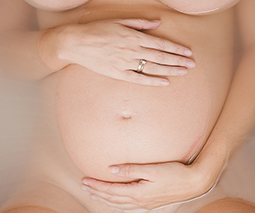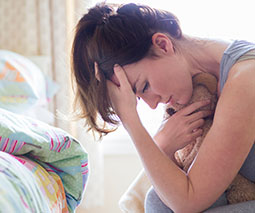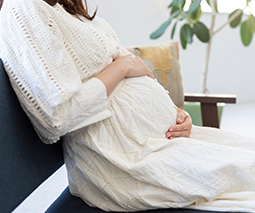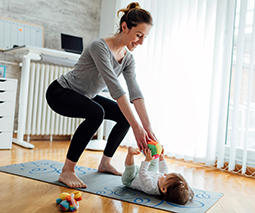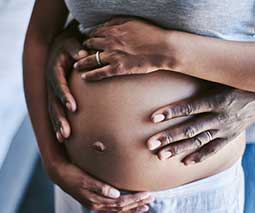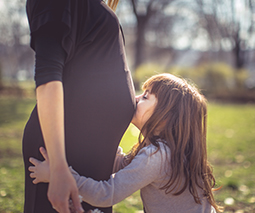“I couldn’t get from the couch to the bathroom”: Pregnancy pelvic girdle pain
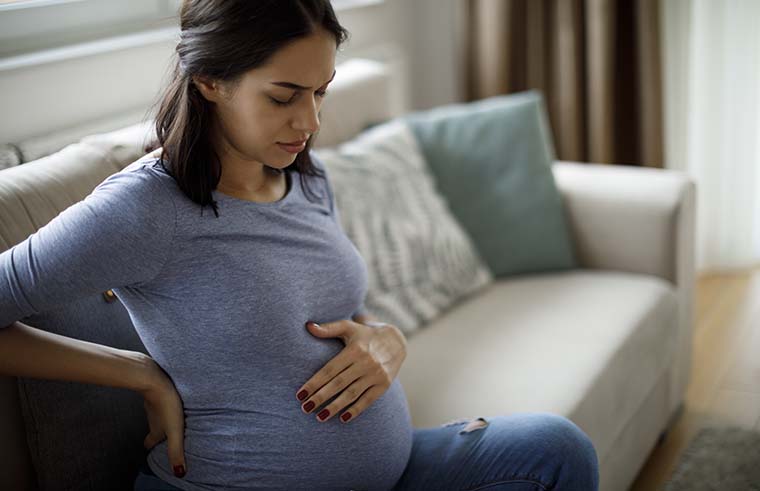
If the never-ending niggles of back pain in pregnancy are getting you down, you’re not alone. Natalie, mother of baby Jack, was experiencing pelvic pain in her pregnancy that was worsening over time. When she finally took action and found relief – she wondered why she didn’t look for answers sooner.
Pelvic girdle pain symptoms
“It was probably around halfway through my second trimester that I start to get a few niggles here and there; the odd bit of round ligament pain which wasn’t too bothersome, but then towards the third trimester, it became quite debilitating pain – pelvic girdle pain – which made it really difficult for me to sort of do daily life.”
“It [the pain] was in the lower area of my abdomen. When I would stand up suddenly or sort of make a sudden movement, I would suddenly get this sort of stabbing pain down there.”

Pelvic girdle pain is a common pregnancy condition that affects about one in five pregnant women and describes the pain – and problems with movement – of the bones and joints in the pelvis.
Physiotherapist and pelvic floor expert, Heba Shaheed explains, “Pelvic girdle pain can be any type of pain in the pelvis, going from your lower back, down through your hips, around your pubic bones. A lot of women with pelvic girdle pain also get pain down their legs. So like a sciatic nerve distribution of pain down the front of their legs; some women even feel it down into their feet.
Listen to Heba Shaheed on the Bellies, Bits & Babies podcast:
“Walking became a real struggle”
Pelvic girdle pain can occur when doing simple everyday activities like walking up the stairs, getting out of the car or into bed. As Natalie put it, “Anything that involved separating my legs in any way.”
“I remember raising a leg to walk – especially if I was going upstairs, or getting into the car or turning over in bed – it was really painful, and it meant that I was quite immobile by that point. By the third trimester, walking became a real struggle.
“Bearing in mind that the distance between my bathroom and my couch is 20 steps, there was a point when the pain was so bad for me to get up and walk somewhere that I was getting my partner to wheel me on his office chair just the distance to the bathroom, because I couldn’t face standing up,” she says.
“It was really quite depressing at the time, especially as it went on and it became worse, and my mobility decreased more and more. I thought I was stuck with it for the rest of my pregnancy – that I’d be being wheeled around in my partner’s office chair for the rest of the pregnancy.”
The pregnancy pain myth
Despite having such a tough time, there are things women suffering such pregnancy-related pain can do to improve and manage their situation.
Heba explains, “Many clients have said to me that their doctor told them, ‘Oh, that’s normal in pregnancy; you’re just going to have to live with it as everyone gets pelvic pain in pregnancy. It’ll go away once you give birth’.”
As a result, women unnecessarily think they have to put up with the pain when in reality, a few simple exercises to strengthen their core can help.
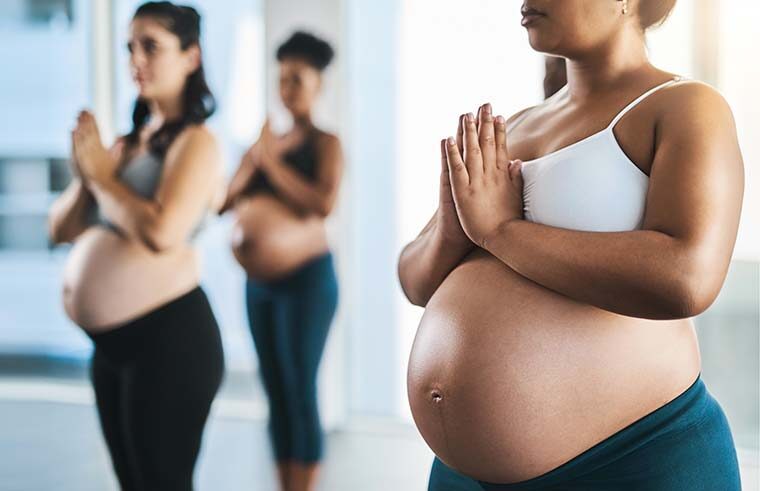
“I could walk to the toilet again”
“Exercise helped a lot,” said Natalie. “Prior to becoming really bad, I was going to pregnancy pilates classes once a week which were great, but I didn’t really have any idea of how important [the classes] were until I stopped going.
“As soon as I went back, there was a difference. Just from one class, that extra bit of mobility and movement and strength building really helped. After that one class, I remember going, ‘Oh wow, I should have come back to this sooner.’ I still had that pain – but I was immediately a bit more mobile. I could walk to the toilet again.”
The key is the core
Whether you are pregnant or planning to fall pregnant, Heba says it’s essential for women to engage in exercises that build core strength.
“So that’s muscles like your pelvic floor, your deep abdominal muscles which are known as the transversus abdominis muscle, and even your breathing diaphragm. Even the way you breathe can really help with pelvic pain.”
As your joints and ligaments become more mobile during pregnancy, extra support is needed from your muscular system “to help provide that strength and stability to your spine and to your pelvis,” Heba explains. “That’s why we really encourage these core stability exercises. And beyond that, also making sure that the muscles in the pelvis and the hips are working. Working your buttock muscles while doing bridges and squats and things like that can really be helpful for women who have pelvic pain.”
Relief after birth
So much pregnancy pain could have heralded a long and difficult labour and birth, but for Natalie, this turned out not to be true.
“My birth experience was actually fine. I wouldn’t say that the pelvic pain impacted on the birth itself at all. And actually, as soon as my waters broke, I felt this immediate weight lift. So the birth itself went quite well, but I did have a particularly large baby – he was four and a half kilos – so it took a long time to get him out. There was a lot of pushing involved.”
Immediate relief from pelvic pain after birth is common due to both the hormone changes that occur, as well as the lightening of the load! However, not all women are as lucky as Natalie.
“Unfortunately some women do experience pelvic pain that persists in the postpartum period,” Heba says. “If you do experience pelvic pain in the postpartum period … look at your muscular support system and ask, ‘Where is the weakness? How am I going to strengthen the muscles so that I can reduce that pelvic pain?’”
After such a difficult pregnancy, Natalie has just one tip to share: “This is what I say to any of my friends who fall pregnant – do some exercise, go to a pilates class or a pregnancy pilates class, go to a yoga class; just do something.
“Even though you feel heavier and weaker, go to those classes to keep your strength up. That that’s the one thing I would say to any anyone expecting a baby.”
 Need some support to be the best parent you can be? Our Parent School parent coaching experts can help. Click to find out more or book a one-on-one session.
Need some support to be the best parent you can be? Our Parent School parent coaching experts can help. Click to find out more or book a one-on-one session.

